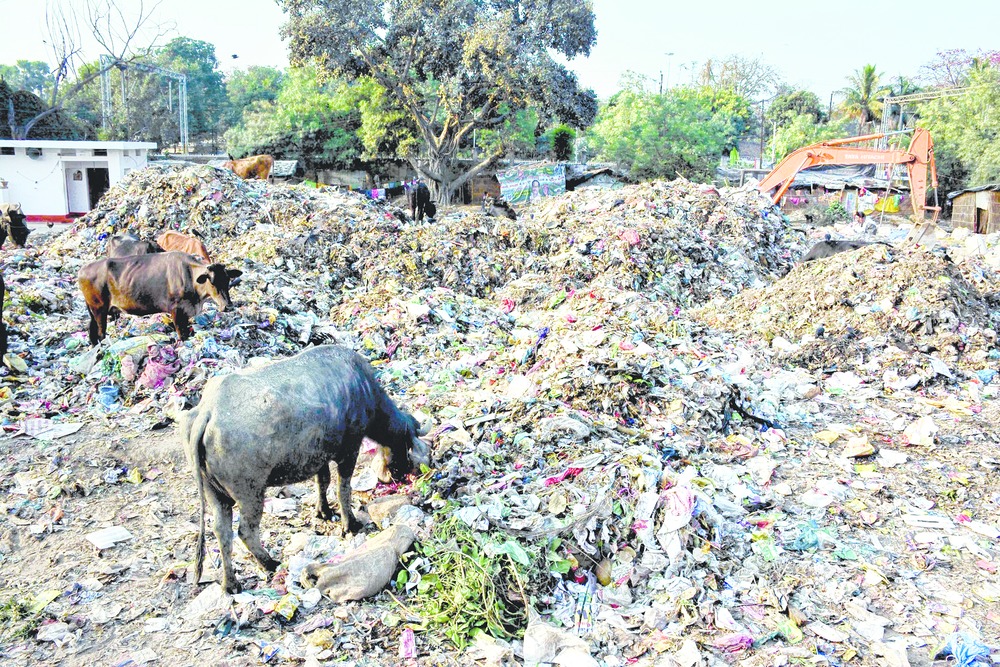
Blame it on civic sense, rather the lack of it. Blame it on civic corporation negligence.
Blame it on anything you want to. But the result — much like the picture — is horrific.
Patna ranks at 70 of the 73 cities on cleanliness scale. On behalf of the Union ministry of urban development, Quality Council of India (QCI) had carried out sanitation survey Swachh Sarvekshan from January 1 to January 20.
Union urban development minister M. Venkaiah Naidu in New Delhi on Monday declared the survey result in which Mysore came first. Last year, during the preliminary survey by Swachh Bharat Mission, Patna ranked 429 among 476 cities.
Instead of taking responsibility of the poor performance, the state government tried to negate the basic authenticity of the survey. “The Union government sets their own parameters for assessing the cities in their schemes such as Smart City and Swachh Bharat Mission, and they also give rankings as per their own agenda. How can they compare big and developed cities like New Delhi, Mumbai, Bangalore and Chandigarh with smaller cities like Patna? The Centre does not want to support us, rather it only believes in defaming us,” urban development and housing department minister Maheshwar Hazari said.
The Swachh Sarvekshan evaluated a city’s sanitation scenario on the basis of several components. (See graphic)
Patna is witnessing back-to-back setbacks lately. First, it failed to make in the overall list of 98 cities short-listed from across the country in the first stage of Smart City competition. Patna had, in fact, ranked third from bottom in the list of 17 cities from Bihar short-listed in the preliminary stage, scoring 35 — only above Buxar and Sitamarhi, which scored 31.25 each.
Deputy chief minister Tejaswi refused to comment on such a sorry state of affairs even though he is the minister in charge for Patna district. He recently chaired a review meeting of the Patna Municipal Corporation (PMC) as well to take stock of the prevailing scenario.
Experts claimed that in both the Smart City scheme as well as Swachh Sarvekshan, the onus of better performance of the city was on the civic body. “Under the Smart City scheme, the onus of preparing proposals and initiating required reforms was on the civic bodies. Similarly, all works assessed under Swachh Sarvekshan fell under the purview of civic bodies. If the PMC had a better track record of delivering quality civic services as per the set parameters, then Patna would have definitely fared better,” said M.K. Pandey, a specialist in urban development affairs.
Pandey claimed the weightage given to solid waste management under the survey was 60 per cent, followed by 15 per cent each for availability and use of household individual toilets and public and community toilets, besides 5 per cent each for city level sanitation plans and information, education and behaviour change communication activities.
Internal conflict has been time and again blamed for poor work culture in the PMC and this time again mayor Afzal Imam tried to put the blame on officials. “The government appoints only new and inexperienced IAS officials as municipal commissioner in the PMC. Majority of the past few commissioners in the PMC belong to post-2000 batches of IAS. These new officers lack experience and they get angry very soon,” said Imam.

Municipal commissioner Jai Singh, on the other hand, blamed it on the slow progress in civic schemes. “Those cities which availed maximum benefits from centrally sponsored Jawaharlal Nehru National Urban Renewal Mission (JNNURM) during 2007-14 have fared better, like those in south India. However, Patna unfortunately made much delay in making progress in the JNNURM schemes. For instance, solid waste management equipment under the JNNURM started getting procured by the end of 2015. We have also been quite slow in making progress in development of solid waste management complex at Bairiya,” Jai said.
Citizens, however, felt they deserved a cleaner city. “I have my head held in shame. Chief minister Nitish Kumar only wants to raise iconic structures like International Convention Centre but he hardly cares about ensuring basic liveable conditions for residents,” said N.K. Choudhary, former principal, Patna College.
Even doctors said the city is unhygienic. “It is due to the unhygienic conditions in the city that around 80 per cent of the residents suffer from gastroenteritis or worm-related diseases at least once every year. Children are suffering from respiratory diseases because of dust particles,” said physician Diwakar Tejaswi.
Citizen participation remained a crucial aspect of the survey. According to QCI officials, they took inputs from more than 2 crore citizens from the 73 cities.
It reflected their opinion on the sanitation facilities available in their respective cities. Ashok Ghosh, faculty-in-charge, department of environment and water management, AN College, said: “It is unfortunate that Patna is among the lowest ranking cities in the country in terms of sanitation. I find authorities as well as residents responsible for such a sorry state of affairs in this city.”










